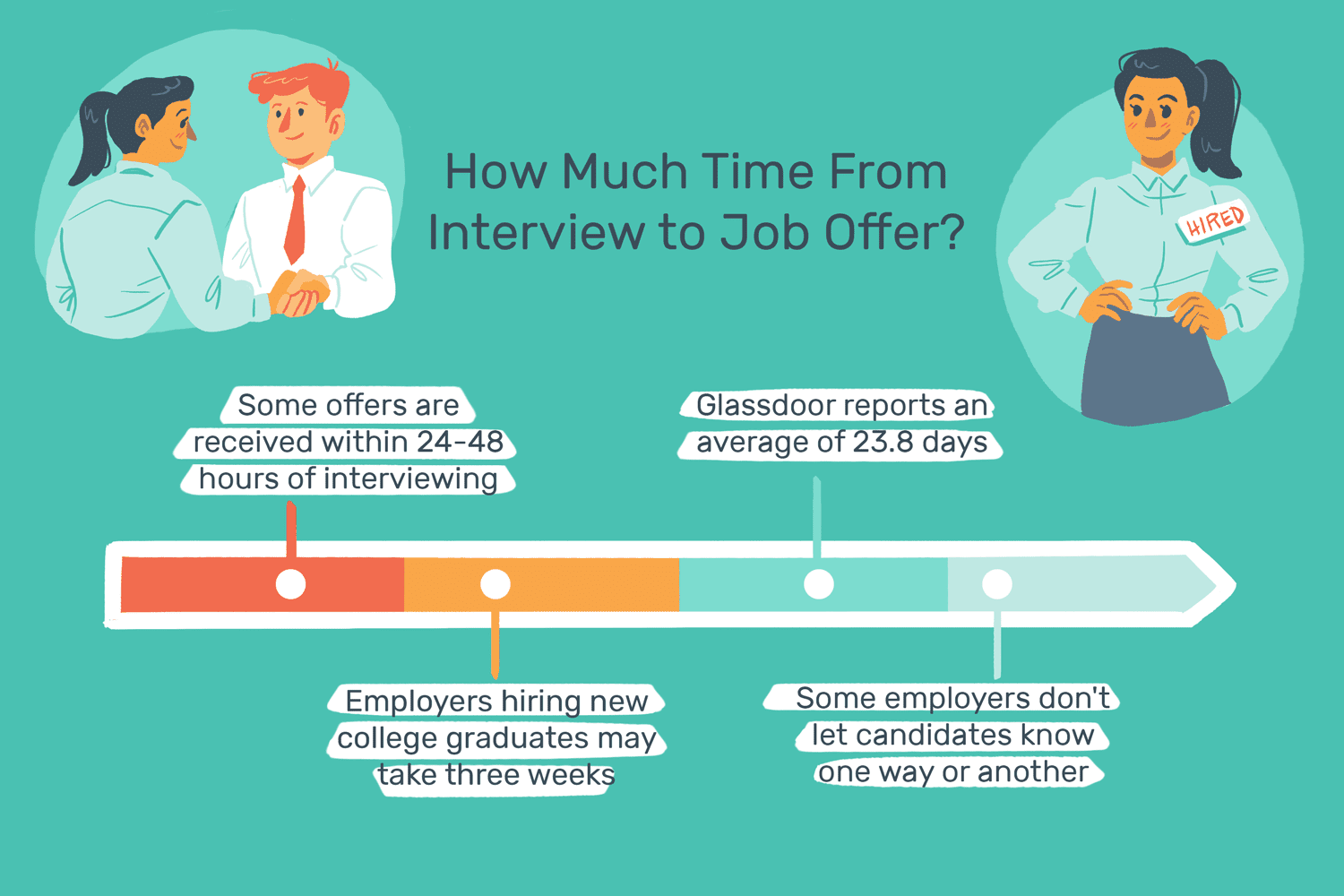How long does it typically take to get a job offer after an interview? When should you expect to hear back after your interview? There is no hard and fast rule about how long employers will take to get back to you with a job offer (or a job rejection).
The hiring process can vary from employer to employer, the type of job you are applying for, and the industry in which you work. You could get an offer in a day or two or it could take weeks.
Here’s a breakdown of the steps in the process and the time it usually takes to go from interview to offer.
From Candidate Review to Job Offer
The hiring process begins when a company posts a job opening and begins accepting applications for that job. The job posting is followed by a review of the submitted applications, which may be processed by an applicant tracking system and then reviewed by a hiring manager.
Next, a portion of the applicants will be invited to participate in the interview process, which might consist of one, two, or multiple interviews. (Some might be by phone, Skype, or Zoom, and others may be in person.)
If the company reaches out to you by asking you to do a video interview, confirm what type of video conferencing software or app they prefer to use, schedule your interview for a time you know you will have seamless internet, and make sure that you will have access to a private location.
note
Do a test run of the video chat program ahead of time if you don’t use it often.
After the first interview, they’ll usually let you know what to expect next. If the first interview is over the phone, they’ll likely want you to do a second interview in person. If you met in person the first time, they should inform you of what will come next, either another meeting or a decision.
Average Amount of Time to Get a Job Offer
The amount of time from interview to job offer varies. For college graduates, the National Association of Colleges and Employers (NACE) Recruiting Benchmarks Survey reports that employers hiring new college graduates take 24 days on average to extend a job offer after an interview.
Glassdoor reports an average of 23.8 days to get an offer in the United States.
note
The time it takes to get an offer can vary significantly based on the employer and the type of position being filled.
For example, Glassdoor reports that the job with the fastest interview process is a waiter at 10.2 days, while the slowest is a professor at 60.3 days.
Your mileage may vary. Depending on when you are job searching, which industry you’re targeting, and what skillset you bring to the table, you may receive an offer within 24 to 48 hours or wait for weeks before hearing a word. Occasionally, employers even ghost candidates for reasons that have nothing to do with the job seekers’ skills or abilities.
Why Does It Take So Long?
There are a number of reasons why an employer might not give you a job offer right away. Firstly, he or she may have more candidates to interview. Depending on scheduling and the number of candidates, this part of the process can take a while.
note
Even if an employer wants to hire you, they may have to run a variety of checks first, including background or credit checks. The hiring manager may also check your references or fact-check your resume. An employer may also need to take the time to put together a job offer package.
Another snag that might cause a delay in your job offer might be a formal human resources (HR) process that requires an HR representative to sign off on a number of steps. The job opening itself might also get delayed or rethought depending on internal issues within the company (this might be due to changes in management, the budget, or a change regarding the person who is vacating the position).
Finally, the hiring manager might also simply be busy with other projects and might not make this hiring process a priority (as frustrating as that is for a job applicant to hear).
What Can You Do While You Wait?
Don’t put all your eggs in one basket. As perfect as this job may seem to you, it’s still a good idea to keep applying and interviewing for other open positions. You can also make a plan for how you want to follow up with the company after the interview.
Follow-Up After the Interview
There is one thing you should do immediately after the interview: Send a thank-you letter or email to the person who interviewed you. Then, you begin the waiting game.
Follow-Up Again If You Don’t Get a Response
If the job offer process seems like it’s taking forever, there are some guidelines to follow. If 10 to 14 days have passed and you haven’t heard back from the employer, you might consider politely checking in again with an email follow-up or phone call.
Plan to expand on something you discussed in your interview or mentioned in your resume; This is a nice way to remind the hiring manager of who you are and why you are a good fit for the position.
Key Takeaways
- The hiring process often consists of multiple interviews. The number of interviews will vary from employer to employer, but you should be prepared for telephone, video, and in-person meetings.
- It may take several weeks to get an offer. Don’t stress if you don’t hear back immediately.
- Follow up the right way. Send a thank you note within 24 hours and a polite follow-up 10 to 14 days later.
- Don’t put all your eggs in one basket. Continue interviewing and job searching until you have accepted a job offer.
